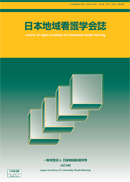Volume 7, Issue 2
Displaying 1-7 of 7 articles from this issue
- |<
- <
- 1
- >
- >|
-
Article type: Article
2005 Volume 7 Issue 2 Pages 5-12
Published: March 18, 2005
Released on J-STAGE: April 20, 2017
Download PDF (1177K) -
Article type: Article
2005 Volume 7 Issue 2 Pages 13-19
Published: March 18, 2005
Released on J-STAGE: April 20, 2017
Download PDF (1169K) -
Article type: Article
2005 Volume 7 Issue 2 Pages 21-26
Published: March 18, 2005
Released on J-STAGE: April 20, 2017
Download PDF (858K) -
Article type: Article
2005 Volume 7 Issue 2 Pages 27-32
Published: March 18, 2005
Released on J-STAGE: April 20, 2017
Download PDF (1185K) -
Article type: Article
2005 Volume 7 Issue 2 Pages 33-39
Published: March 18, 2005
Released on J-STAGE: April 20, 2017
Download PDF (1179K) -
Article type: Article
2005 Volume 7 Issue 2 Pages 41-47
Published: March 18, 2005
Released on J-STAGE: April 20, 2017
Download PDF (1214K) -
Article type: Article
2005 Volume 7 Issue 2 Pages 49-54
Published: March 18, 2005
Released on J-STAGE: April 20, 2017
Download PDF (957K)
- |<
- <
- 1
- >
- >|
